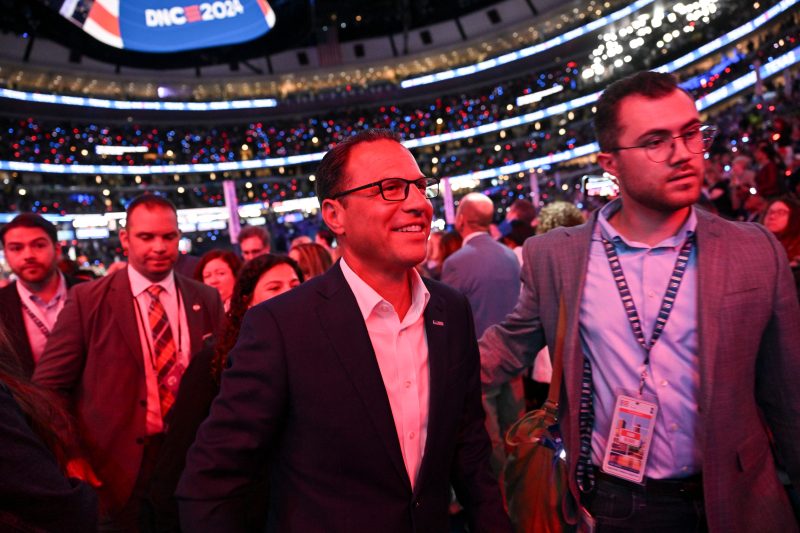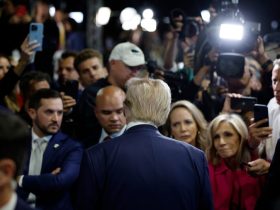CHICAGO — Pennsylvania Gov. Josh Shapiro may not be taking the convention stage Wednesday night as the vice-presidential nominee, but his prime-time address is still a significant political moment for a Democratic rising star widely seen as a future presidential contender.
Shapiro faced some of the toughest scrutiny of any of Vice President Kamala Harris’s finalists, and she ultimately did not choose him to be her running mate. But this week in Chicago, Shapiro has crisscrossed the city attending delegation breakfasts and advocating enthusiastically for the Harris-Walz ticket, as well as for himself. His convention speech will be his formal introduction to a national audience.
The first-term governor ran in 2022 against a far-right election denier and made “real freedom” the central tenet of his campaign, seeking to reclaim a word Republicans have long owned. “Freedom” is now the watchword of the Harris campaign and the theme of the convention Wednesday night.
Shapiro’s ability to win over some Republicans in Pennsylvania is a point of pride for the governor, who in 2022 prevailed in four counties that went for Trump in 2020 and came close to claiming several others. His allies say that crossover appeal would have helped Harris lock down Pennsylvania, a crucial swing state.
As governor, Shapiro has made “get s–t done” his office’s motto, embracing a pragmatic style of governance. He received praise for the swift reconstruction of an Interstate 95 bridge that collapsed in Philadelphia last year, beating many expectations for how much time the work would take. When a freight train derailed in East Palestine, Ohio, just miles from the Pennsylvania border, Shapiro was vocal in demanding accountability from the Norfolk Southern rail company for the accident and the risks it posed to public health.
More recently, after a gunman attempted to assassinate former president Donald Trump in Butler, Pa., Shapiro visited the scene and called a Trump supporter who was killed at the event a “hero.” The shooter’s motives remain unclear.
“Disagreements are okay, but we need to use a peaceful political process to settle those differences,” Shapiro said in Butler. “This is a moment where all leaders have a responsibility to speak and act with moral clarity, where all leaders need to take down the temperature and rise above the hateful rhetoric that exists and search for a better, brighter future for this nation.”
Shapiro is regarded in his party as an effective communicator, adopting a cadence in speeches that some have compared to former president Barack Obama. He recently went viral during a television interview when he said Trump needed to “stop s–t-talking America,” a line he has repeated on the campaign trail.
Shapiro has sought to broaden the party’s appeal and win back some of the working-class voters who defected to Trump in recent years. His first action as governor was an executive order eliminating a four-year college degree requirement for thousands of state government jobs, a move that drew praise from conservative media.
But as he has burnished his bipartisan credentials, some of his positions have prompted criticism from fellow Democrats. Shapiro has drawn backlash from some environmental groups for striking deals with natural gas companies that allow them to continue fracking in exchange for stricter safety and public health regulations.
He has also advocated for private school vouchers, a typically conservative position that infuriated teachers unions, even as he secured the largest increase in public school funding in state history in a bipartisan budget agreement.
His staunchly pro-Israel stance and sharp rebuke of pro-Gaza college protesters at the University of Pennsylvania has also attracted criticism from some liberal Democrats. As Harris was mulling her decision, some anti-Israel activists publicly urged her not to pick “Genocide Josh.”
Some Shapiro allies said those attacks were antisemitic, given that they focused on a Jewish candidate whose positions did not differ much from some of the other Democrats under consideration. After Harris selected Minnesota Gov. Tim Walz, Trump accused the vice president of not picking Shapiro because he was Jewish, an assertion that Shapiro and other Democrats have vehemently denied.
“Donald Trump is completely full of it and he’s trying to use me and he’s trying to use other Jews to divide Americans further,” Shapiro told reporters this week.
Shapiro speaks openly about his Jewish faith, often using it to explain his call to public service. He says his scripture taught him that “No one is required to complete the task — but neither are we free to refrain from it.”
When he ran for governor in 2022, Shapiro faced state Sen. Doug Mastriano, a far-right Christian nationalist with ties to Gab, a social media site popular with white supremacists. During the campaign, Mastriano espoused antisemitic tropes, saying Shapiro had “disdain for people like us” because he and his children attended a “privileged, exclusive, elite” Jewish school in the Philadelphia suburbs.
Shapiro beat Mastriano by nearly 15 percentage points in a state Biden narrowly won in 2020.
In 2016, Shapiro won his first statewide race, for attorney general, by 11 percentage points. That same year, Donald Trump narrowly beat Hillary Clinton in Pennsylvania.
As the state’s attorney general, Shapiro oversaw investigations into the sexual abuse of more than 1,000 children by Catholic priests and secured a $1 billion settlement against U.S. pharmaceutical companies for their role in the opioid epidemic. He also defended the state against efforts by the Trump campaign to challenge its 2020 election results.
He has also served as a Montgomery County commissioner, and before that in the state House. As a young legislator in Harrisburg, he helped broker a deal for a moderate Republican to be speaker of the House while Democrats would have control over the agenda. In return, Shapiro was made deputy speaker — a job created for him.
Shapiro’s political career began with an audacious run for student body president as a college freshman.
He won, and hasn’t lost an election since.








